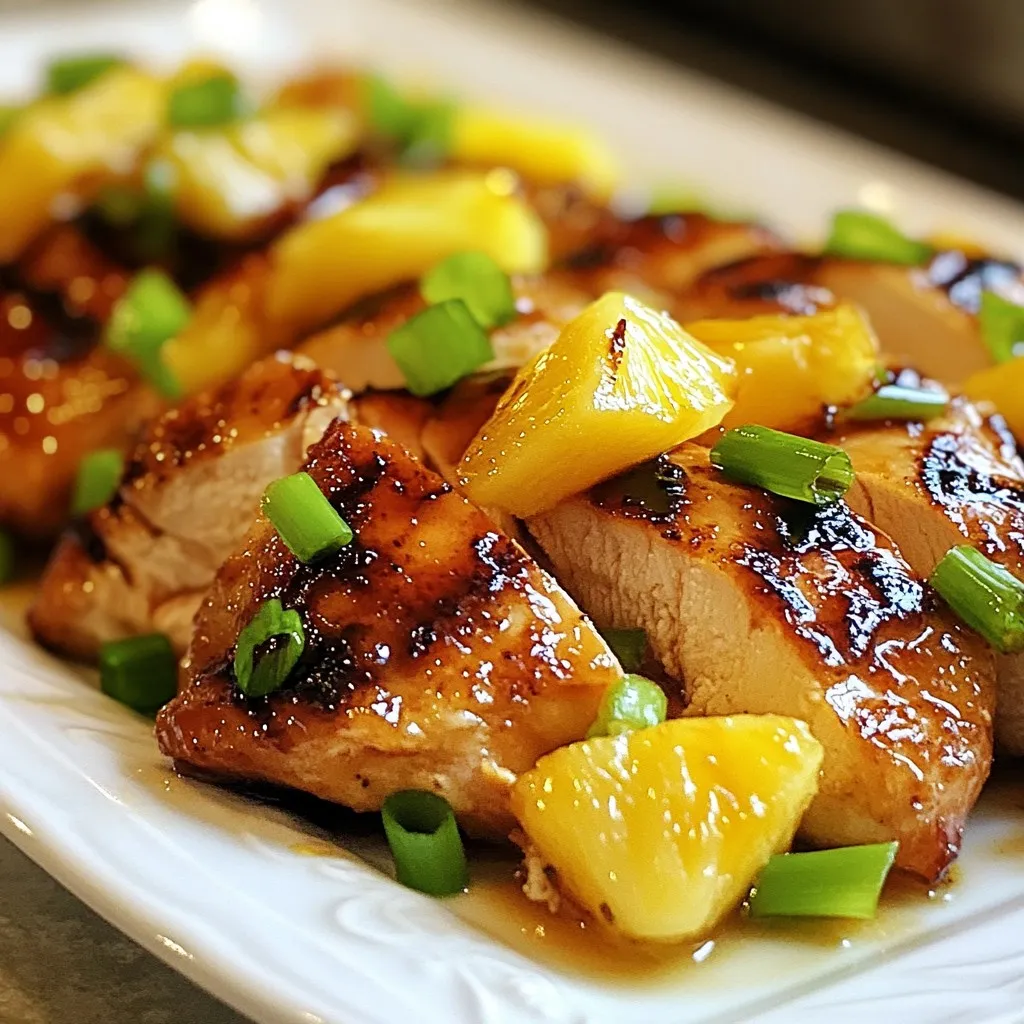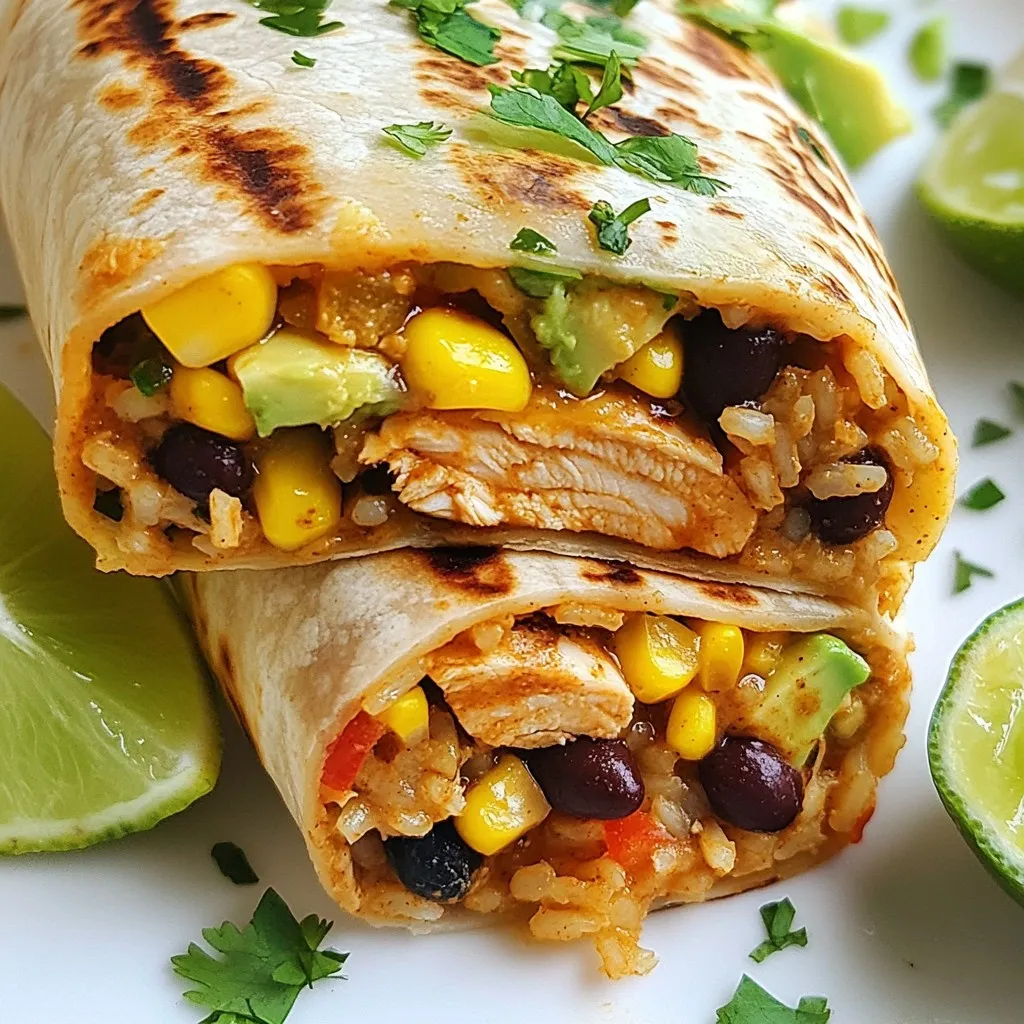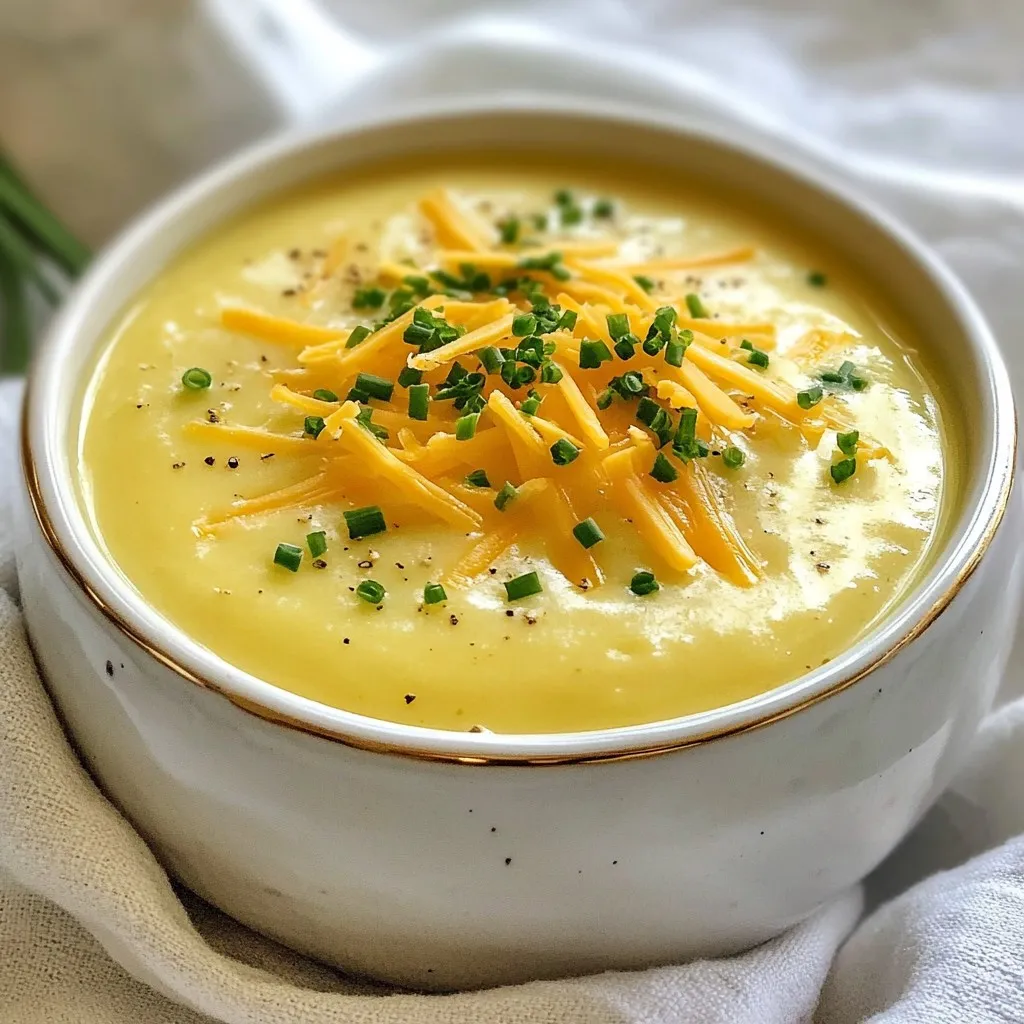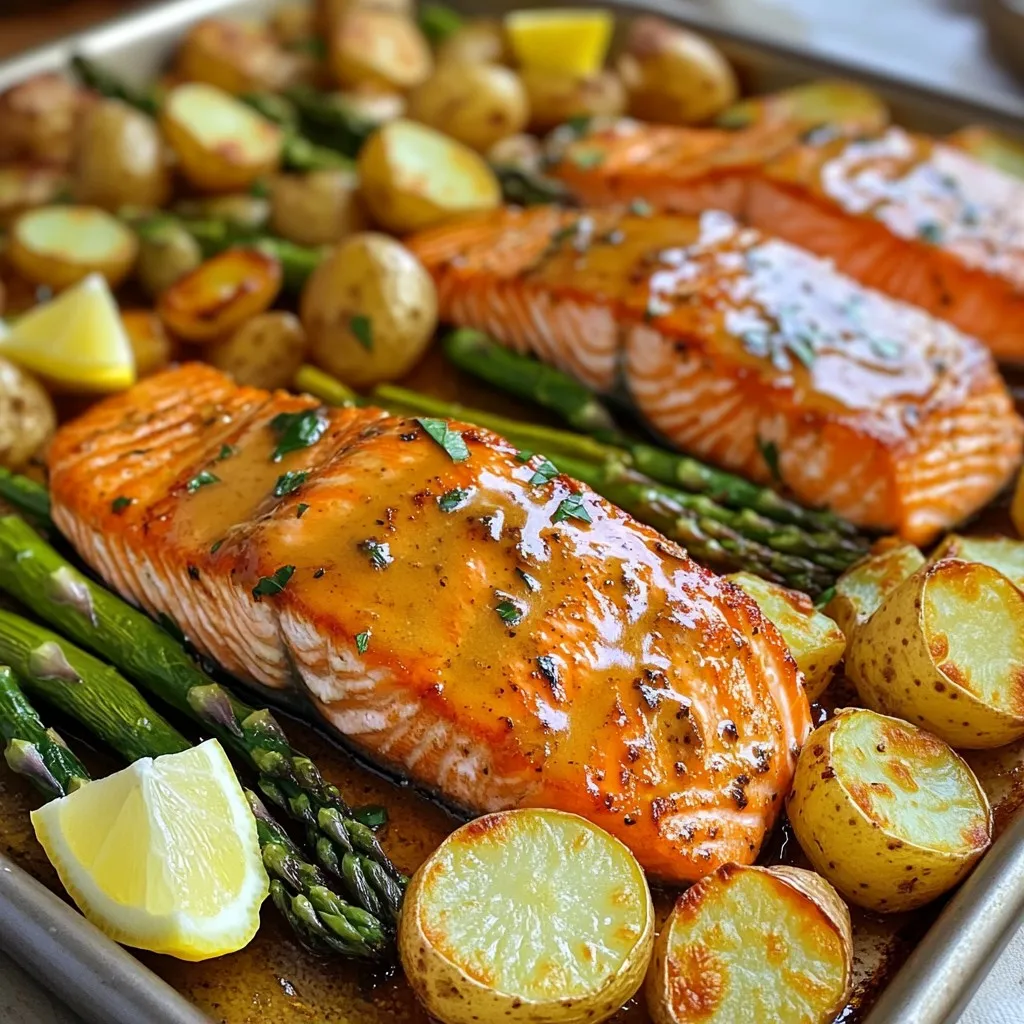
Craving a quick and tasty dinner? Maple Dijon Sheet-Pan Salmon is your answer! This simple, one-pan meal combines sweet maple syrup and tangy Dijon mustard for rich flavor. With just a few fresh ingredients like salmon, baby potatoes, and asparagus, you can whip up a dish that’s not only easy but also healthy. Let’s dive into this delicious recipe you can make any night of the week!
Ingredients
List of Ingredients
– 4 salmon fillets (approximately 6 ounces each)
– 3 tablespoons pure maple syrup
– 2 tablespoons Dijon mustard
– 1 tablespoon extra-virgin olive oil, plus more for potatoes
– 2 cloves garlic, finely minced
– 1 teaspoon fresh thyme leaves (or 1/2 teaspoon dried thyme)
– Salt and freshly ground black pepper, to taste
– 1 pound baby potatoes, halved
– 1 bunch fresh asparagus, trimmed
– Lemon wedges, for serving
Ingredient Substitutions
Alternative proteins: You can swap salmon with chicken breasts or tofu. Both options work well with the maple Dijon glaze.
Sweetener options: If you need a different sweetener, use honey or agave. They both add a nice taste.
Gluten-free variations: This recipe is gluten-free as is. Just ensure your Dijon mustard does not have gluten.
Step-by-Step Instructions
Prepping the Oven and Ingredients
– First, preheat your oven to 425°F (220°C). This helps the food cook evenly.
– In a bowl, mix 3 tablespoons of maple syrup, 2 tablespoons of Dijon mustard, and 1 tablespoon of olive oil. Add 2 cloves of minced garlic and 1 teaspoon of fresh thyme. Stir this until it blends well. This maple Dijon sauce adds a great flavor to the salmon.
Roasting Baby Potatoes
– On one side of a large baking sheet, place 1 pound of halved baby potatoes. Drizzle them with olive oil and sprinkle with salt and pepper. Toss them to coat well. To get them crispy, lay the cut sides down.
– Roast the potatoes for about 15 minutes. This step makes them sweet and golden.
Cooking Salmon and Asparagus
– After 15 minutes, take out the baking sheet. Pat 4 salmon fillets dry with a paper towel. Place them on the other side of the baking sheet from the potatoes.
– Brush the salmon fillets with the maple Dijon mixture. If any sauce is left, drizzle it over the potatoes for extra flavor.
– Toss a bunch of trimmed asparagus in olive oil with a little salt and pepper. Add them to the baking sheet.
– Put the baking sheet back in the oven. Roast for another 12 to 15 minutes. The salmon should flake easily, and the potatoes must be tender and brown.
Tips & Tricks
Perfecting the Salmon
How to check doneness
To check if your salmon is done, use a fork. Gently press the fish. If it flakes easily, it’s ready. The inside should be a light pink color. A food thermometer is great too. Aim for an internal temperature of 145°F (63°C).
Troubleshooting common issues
If your salmon is dry, it may have cooked too long. Watch the time closely. If the skin sticks to the pan, make sure to oil it well before placing the fish. Also, patting the fillets dry helps them sear nicely.
Enhancing Flavor Profiles
Additional herbs and spices
You can add more flavor by using fresh dill or parsley. A pinch of smoked paprika gives a nice twist. Experiment with spices like cayenne for heat or lemon zest for brightness.
Marinating tips for deeper flavor
For a richer taste, marinate your salmon for 30 minutes before cooking. Mix the maple Dijon sauce and let the fish soak in it. This helps the flavors infuse deep into the salmon.
Plating and Presentation
Garnishing suggestions
For a pop of color, sprinkle fresh parsley over the salmon. You can also use thin lemon slices as a garnish. This adds a bright look and a hint of flavor.
Serving tips with lemon wedges
Serve your dish with lemon wedges on the side. The fresh juice enhances the flavor of the salmon and veggies. Squeeze it over everything just before eating for a zesty kick.
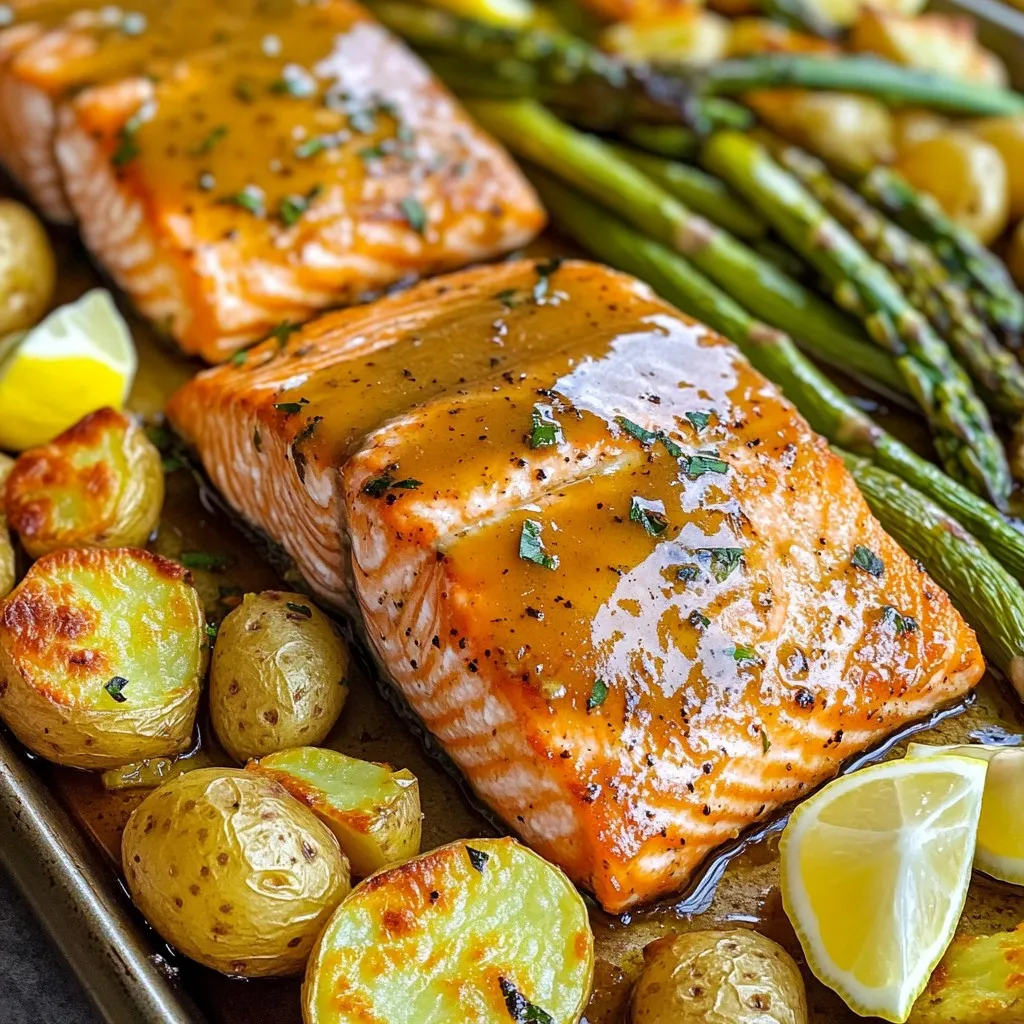
Variations
Seasonal Vegetable Alternatives
You can easily swap out the asparagus in this dish. Try green beans, broccoli, or zucchini instead. These veggies roast well and add great flavor. Just remember to cut them into similar sizes for even cooking.
If you want to add some color, think about using bell peppers or carrots. They bring a nice crunch and sweetness. You can also mix different vegetables for a fun twist. Just toss them in olive oil, salt, and pepper.
Sauce Variations
While the maple Dijon sauce is tasty, you can try other flavors. For a spicy kick, mix in some chili paste or sriracha. This will give your salmon a fun heat.
You may also try a honey garlic glaze. Just mix honey, soy sauce, and minced garlic for a sweet and savory blend. Another option is a lemon herb sauce. Combine fresh lemon juice, dill, and a bit of olive oil for bright flavor.
Customizing for Dietary Restrictions
If you want a low-carb meal, skip the baby potatoes. Add more asparagus or other non-starchy vegetables instead. This keeps the dish light and healthy.
For a dairy-free option, make sure all your ingredients are free of dairy. The maple syrup and Dijon mustard are safe choices. You can enjoy this dish without any dairy products, and it will still taste great.
Storage Info
Leftover Storage Guidelines
– Use airtight containers to store leftovers.
– Glass or plastic containers work well.
– Let the salmon cool before sealing.
– Refrigerate within two hours of cooking.
– Consume within 3 days for best taste.
Reheating Instructions
– The best method to reheat salmon is in the oven.
– Preheat the oven to 275°F (135°C).
– Place salmon on a baking sheet and cover with foil.
– Heat for about 15 minutes or until warm.
– This keeps the salmon moist and tasty.
Freezing Tips
– To freeze the cooked dish, let it cool completely first.
– Wrap each portion tightly in plastic wrap.
– Place the wrapped salmon in a freezer bag.
– Remove as much air as possible to prevent freezer burn.
– For best quality, use within 2 months.
FAQs
How do you know when the salmon is done?
You can check if your salmon is done by using a meat thermometer. Insert it into the thickest part of the fish. The safe internal temperature for salmon is 145°F (63°C). You can also check for doneness by gently flaking the fish with a fork. If it flakes easily, it is ready to eat. The flesh should appear opaque and moist.
Can I use frozen salmon?
Yes, you can use frozen salmon for this recipe. Thaw the salmon in the fridge overnight or use the quick method. Place the fillets in a sealed bag and submerge them in cold water for about 30 minutes. After thawing, pat the salmon dry before cooking. This will help it sear nicely.
What side dishes pair well with Maple Dijon Salmon?
Maple Dijon salmon goes well with several side dishes. Here are some tasty options:
– Roasted baby potatoes
– Steamed green beans
– Quinoa salad
– Garlic bread
– Mixed greens with vinaigrette
These sides will enhance the meal and complement the flavors of the salmon. Enjoy experimenting with your favorites!
You learned how to make a delicious Maple Dijon Salmon dish. We covered ingredients, cooking tips, and ways to enhance flavor. Don’t forget to customize with seasonal veggies or sauces to fit dietary needs. Proper storage and reheating are key for leftovers. Enjoy your meal and impress your friends with your cooking skills. This dish is fun, easy, and full of taste. Give it a try!

Maple Dijon Sheet-Pan Salmon
A delicious and easy sheet-pan meal featuring salmon fillets glazed with a maple Dijon sauce, served with roasted baby potatoes and asparagus.
Ingredients
Instructions
- 1
Preheat your oven to 425°F (220°C), ensuring it's hot enough for a perfect roast.
- 2
In a small mixing bowl, combine the maple syrup, Dijon mustard, 1 tablespoon of olive oil, minced garlic, thyme, and a pinch of salt and pepper. Whisk until the mixture is smooth and well blended.
- 3
On one side of a large baking sheet, arrange the halved baby potatoes. Drizzle them with a little olive oil, sprinkle with salt and pepper, and toss to ensure even coating. For optimal roasting, place the cut sides of the potatoes down on the sheet.
- 4
Roast the potatoes in the preheated oven for 15 minutes. This will start to bring out their natural sweetness and create a crispy exterior.
- 5
After the first 15 minutes, take the baking sheet out of the oven. Pat the salmon fillets dry with a paper towel to help them sear nicely. Place the fillets on the opposite side of the baking sheet from the potatoes.
- 6
Generously brush the fillets with the prepared maple Dijon mixture. Don’t forget to drizzle any remaining sauce over the potatoes for added flavor!
- 7
Toss the trimmed asparagus in a drizzle of olive oil, along with a sprinkle of salt and pepper, then add them to the baking sheet.
- 8
Return the baking sheet to the oven and roast for an additional 12-15 minutes, or until the salmon is cooked through, easily flakes with a fork, and the potatoes are tender and golden-brown.
- 9
Once cooked, carefully remove the sheet pan from the oven and let it rest for a few minutes. This helps the flavors to settle.
- 10
To serve, place a salmon fillet on each plate alongside a generous portion of roasted potatoes and asparagus. Add lemon wedges on the side for a refreshing burst of flavor.
Chef's Notes
Serve each plate garnished with freshly chopped parsley and squeeze fresh lemon juice over the salmon and vegetables just before serving for added brightness.

Recipe Creator
Remy
I’m Chef Remy, your recipe companion, here to bring warmth, bold taste, and simplicity to your kitchen.
View My Recipes